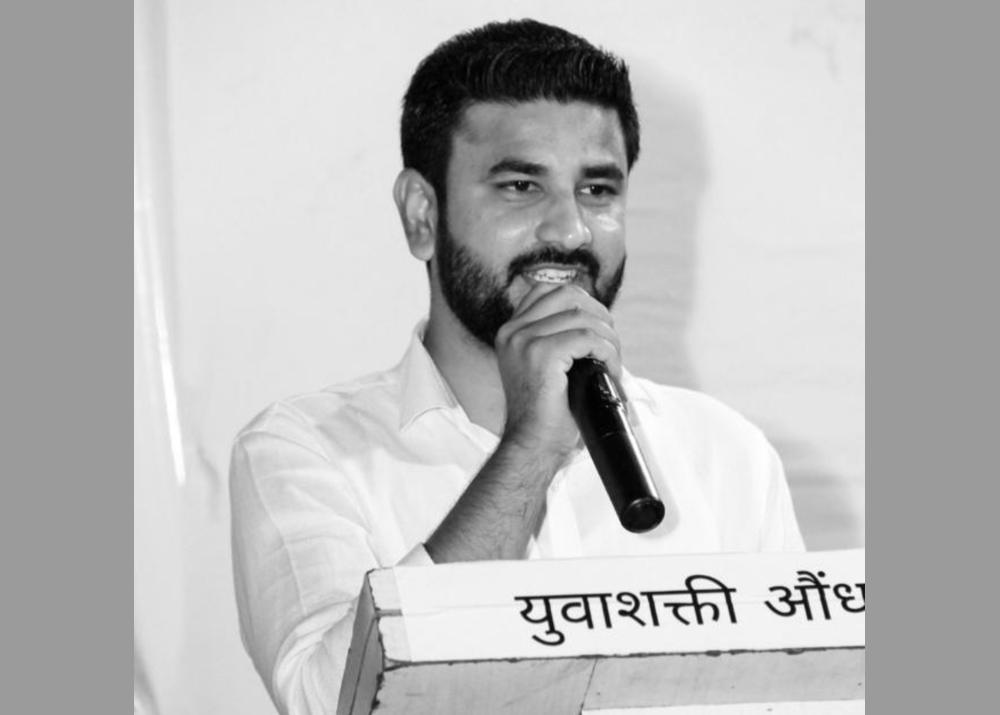“Educate, agitate, and organize,” Dr. B. R. Ambedkar’s potent call to action, echoes powerfully in the heart of Adv. Rohit Agale. His journey in education is not merely about dispensing knowledge; it’s about igniting critical minds, challenging the status quo, and building communities of empowered individuals.
Rohit’s passion for education bloomed when he realized that it’s the only way to end the cycle of deprivation in his community. Since then, he has built a remarkable career as a practicing advocate and educator. But beyond the accolades, he finds true fulfilment in advancing the slum community where he grew up and did not receive career guidance, which he now is providing to the upcoming young generation.
Adv. Rohit Agale, Founder of Yuvashakti, precisely encapsulates Dr. B. R. Ambedkar’s philosophy through his approach. The classroom becomes a crucible for education, yes, but also for agitation against injustice, for organizing minds to dismantle inequities, and for creating a future where every voice is heard.
For Rohit, it’s not enough to simply teach; it’s about empowering students to become agents of change, architects of a more just and equitable world.
In the following interview with IMPAAKT, Rohit takes us through his inspiring journey, so dive in!
Rohit, can you share a bit about your personal background and what initially drew you towards the field of education?
Certainly, my personal background is rooted in a marginalized community, growing up in a slum area where access to education was limited. The lack of guidance during my childhood made it challenging to navigate the path towards education and career. This experience fueled my commitment to the field of education, as I realized the importance of creating resources for the next generation, ensuring they have the opportunities I didn’t.
How has your own educational journey influenced your commitment to providing educational opportunities for underprivileged students?
My limited access to quality education propelled me to create resources for underprivileged students. The struggles I faced in obtaining quality education became the driving force behind my commitment to ensuring that others, especially from marginalized communities, do not face similar challenges.
Before founding Yuvashakti, did you have any specific experiences or moments that sparked the idea of creating a free tuition project for marginalized communities?
Absolutely, the idea of Yuvashakti was sparked during the pandemic when school closures disproportionately affected students in marginalized communities. Recognizing the digital divide, with students lacking access to online education, I transformed my earlier informal classes in the slums into the Yuvashakti free tuition project. This shift aimed to bridge the educational gap exacerbated by the pandemic.
Were there any significant mentors or influencers in your life who played a crucial role in shaping your vision for Yuvashakti’s educational initiatives?
Dr. Babasaheb Ambedkar has been my sole guiding influence. His life, thoughts, and educational journey inspired me to initiate and sustain Yuvashakti. His lifelong commitment to education as a tool for social change resonated deeply with me, shaping the vision of Yuvashakti.
How has the Yuvashakti free tuition project made a positive impact on the lives of students from marginalized communities?
Since the inception of Yuvashakti, there has been a noticeable improvement in students’ academic performance. The project has not only enhanced their educational abilities but also served as a deterrent to negative activities prevalent in the slums. By engaging in Yuvashakti’s classes, students have shifted their focus away from detrimental behaviors, creating a positive impact on their overall well-being.
What challenges did you face while initiating and running the free tuition project, and how did you overcome them?
Initiating the project posed challenges, primarily in recruiting volunteers and finding suitable spaces for classes. Overcoming these obstacles involved organizing likeminded youth, conducting motivational sessions, and collaborating with local authorities to secure spaces in Buddha Vihars and Samaj Mandirs. The commitment of volunteers and strategic partnerships helped overcome these initial hurdles.
What role do volunteers and educators play in the success of the free tuition project, and how are they recruited and trained?
Volunteers and educators are the backbone of Yuvashakti. Recruiting mainly from youth pursuing higher education ensures a dynamic and enthusiastic team. Training sessions, conducted by the lead team, equip them with the necessary skills. Ongoing support and collaboration foster a dedicated and impactful group of volunteers and educators.
In your opinion, what role does education play in breaking the cycle of poverty for underprivileged students?
Education is the key to breaking the cycle of poverty for underprivileged students. Unlike other means of income generation, education provides a sustainable path to empowerment, enabling individuals to transcend economic constraints and create a brighter future for themselves and their communities.
As an advocate, how do you raise awareness about the importance of education for underprivileged children and the initiatives taken by Yuvashakti?
My advocacy efforts extend to my legal profession, where I emphasize the transformative power of education. Completing my law degree simultaneously with founding Yuvashakti allows me to convey the message that education is the cornerstone of societal upliftment.
What is your vision for the future of Yuvashakti’s free tuition project, and how do you plan to expand its reach and impact?
Our vision is to empower every Yuvashakti student to pursue higher education, including central and international universities. Expansion plans include reaching more areas within the district and state, ensuring that the transformative impact of Yuvashakti extends to a broader audience.
How do you encourage community involvement and parental support in the educational journey of the students enrolled in Yuvashakti programs?
The positive results achieved by Yuvashakti serve as the strongest encouragement for community involvement and parental support. By showcasing the academic improvement and behavioral changes in students, we create a sense of pride and responsibility within the community, fostering continued support for the educational journey of enrolled students.
What advice do you have for other educators and organizations aiming to make a positive impact on the education of underprivileged students in India?
My advice is simple yet profound: work with the genuine intention of giving back to society. The focus should be on the greater good, not personal gain. A selfless commitment to the cause will sustain the efforts and contribute significantly to the betterment of underprivileged students.
As an individual who wears multiple hats – advocate, founder, and educator – how do you manage your time and prioritize your responsibilities?
Maintaining a strict schedule and merging personal and professional lives into a single, social-focused entity allows me to prioritize Yuvashakti and my advocacy work. The integration of my roles as an advocate, founder, and educator enables me to leverage one for the benefit of the other, creating a harmonious and impactful balance.











